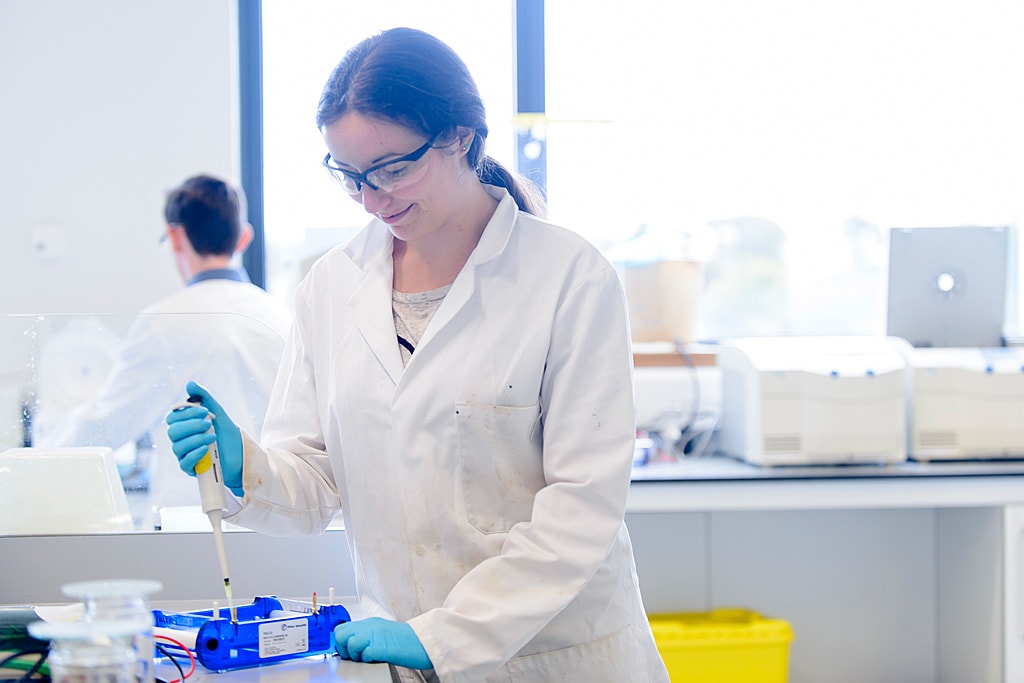Course Information
Full Time – Undergraduate Studies
BSc (Hons) (NFQ Level 8)
CAO Code: DN200
CAO Points Range 2019: 521
Length of Course: 4 Years
Average Intake: 400
- O2/H6 in Mathematics
- O2/H6 in a laboratory science (Applied Mathematics, Computer Science or Geography may be used instead of a laboratory science subject) and
- O6/H7 in English, Irish and two other recognised subjects
- A-Level/GCSE
- Other EU Applicants
- Non-EU Applicants
- QQI FET Entry Routes
- Level 6/7 Progression Routes
Why is this course for me?
If you’re interested in why some families are more prone to disease and how to use biotechnology to produce drugs and other products, then a degree in Genetics could be for you. Genetics is the scientific study of heredity – how information is passed from one generation to the next. You’ll study developing new areas, such as personal genomics, which uses DNA sequence to determine health and ancestry. The UCD Genetics degree also covers genetic engineering and biotechnology, transgenic animals, genetically modified plants, medical genetics, molecular evolution, developmental biology, DNA fingerprinting and bioinformatics.
Career & Graduate Study Opportunities
Most Genetics graduates work in:
- Hospital laboratories
- Biotechnology, pharmaceutical and genomics companies
- Forensic science laboratories
- Agribiotech and horticulture companies
- Food and drink companies
Many graduates study for a higher degree (MSc/PhD), or obtain additional professional qualifications such as in Medicine and Dentistry.
MSc programmes at UCD include the areas of Biotechnology, Biotechnology and Business, and Biotherapeutics.
What Will I Study
This is a sample pathway for a degree in Genetics. Topics include evolution, genetic disease and biotechnology, as well as core modules in biomolecular and biomedical science.
First Year
- Biology
- Chemistry
- Mathematics
- Optional Science modules
- Elective modules
Second Year
- Genetics
- + 2 Other Science Subjects
- Elective Modules
Third Year
- Genetics
- Elective Modules
Fourth Year
- Genetics (includes a research project)
All Science courses are full time, with many student timetables running from 9.00am to 5.00pm or later. Depending on the subject choices, a weekly timetable can include lectures, practicals and tutorials.
Assessment varies with each module but may comprise continuous assessment of practicals, written exams and online learning activities.
International Study Opportunities
Genetics students in third year have to date studied in:
- University of Amsterdam, the Netherlands
- University of California, Irvine, USA
- University of Connecticut, USA
- Queen’s University, Canada
Genetics students also have the opportunity to carry out their fourth year project at the University of Copenhagen, Denmark.
Testimonial
“One of the things I loved about the DN200 Science course is the huge amount of flexibility. The course structure meant that I got to experience each degree subject early on, allowing me to make informed decisions on my area of interest as the course progressed. Genetics is a field at the forefront of modern biological research, looking at everything from the inheritance of traits, to the genetic basis of disease, to unravelling the evolutionary history of modern organisms. A BSc in Genetics opens a huge number of doors across the Science sector and a variety of business areas. I am now completing a PhD at the European Molecular Biological Laboratory in Germany using Structural Genetics to study the effect of ageing on human blood stem cells.”
Karen Grimes Graduate

